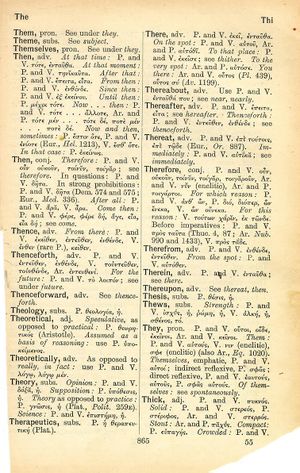theoretical: Difference between revisions
From LSJ
Ὁ δὲ μὴ δυνάμενος κοινωνεῖν ἢ μηδὲν δεόμενος δι' αὐτάρκειαν οὐθὲν μέρος πόλεως, ὥστε ἢ θηρίον ἢ θεός → Whoever is incapable of associating, or has no need to because of self-sufficiency, is no part of a state; so he is either a beast or a god
(CSV5) |
m (Woodhouse1 replacement) |
||
| Line 1: | Line 1: | ||
{{Woodhouse1 | {{Woodhouse1 | ||
|Text=[[File:woodhouse_865.jpg|thumb|link={{filepath:woodhouse_865.jpg}}]] | |Text=[[File:woodhouse_865.jpg|thumb|link={{filepath:woodhouse_865.jpg}}]] | ||
===adjective=== | |||
[[speculative]], as opposed to [[practical]]: [[prose|P.]] [[θεωρητικός]] (Aristotle). | |||
[[assumed as a basis of reasoning]]: use [[prose|P.]] [[ὑποκείμενος]]. | |||
}} | }} | ||
Revision as of 09:08, 20 May 2020
English > Greek (Woodhouse)
adjective
speculative, as opposed to practical: P. θεωρητικός (Aristotle).

